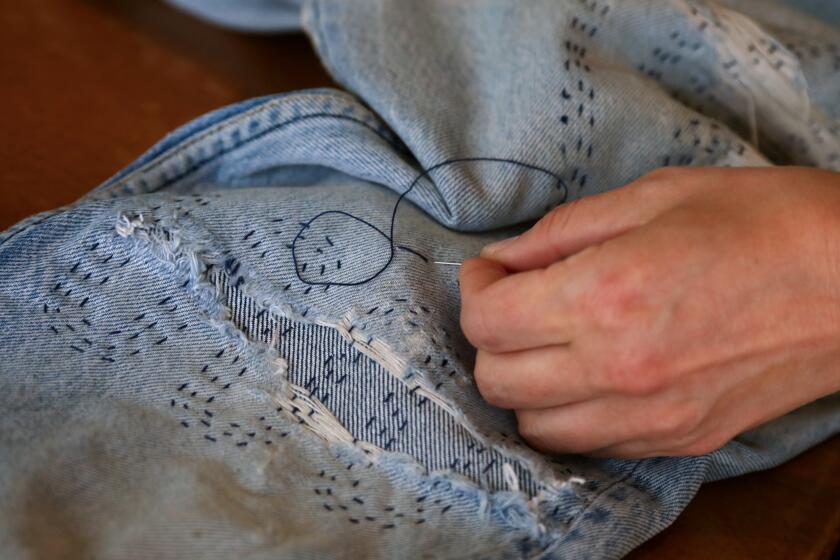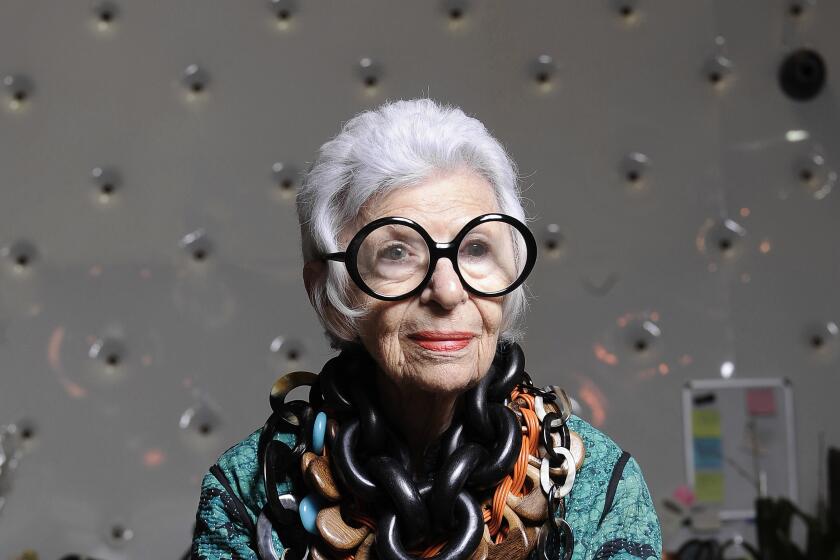Handmade-goods movement goes corporate
Truly, we are living in crafty times. In downtown Los Angeles this weekend, Unique L.A., an independent design marketplace founded two years ago, goes head-to-head with the 7-year-old Chicago-based Renegade Craft Fair. The two fairs have some 500 vendors vying for tens of thousands of holiday shoppers, plus they have additional competition from an unlikely source: the mall.
Many merchants dabble in made-by-hand crafts during this season, but two decidedly modern home décor retailers catering to young adults — West Elm and Crate & Barrel’s cheap and cheerful spinoff CB2 — are making a big, strategic push to woo the do-it-yourself decorators who fueled the last decade’s crafts revival. At West Elm and CB2, small-batch letterpress stationery from Brooklyn and San Francisco is for sale alongside felt ornaments made in Nepal and pottery proudly touted as made in China — by artisans.
For the organizers of Unique L.A. and Renegade Craft Fair, the idea of handmade modernism, it appears, is going corporate.
“Do I raise an eyebrow when I see ‘Handmade Holidays’ in a West Elm catalog? Maybe a little bit,” Unique L.A. founder Sonja Rasula said. “They know that they can make money, but I would like to believe that there is new, young blood in these companies and they believe in the movement.”
Marta Calle, the brand director of CB2, is a believer. Though the retailer has yet to partner with American craftsmen, she shops the boutiques of Chicago’s handmade community and is a fan of Etsy, the online craft marketplace. In 2009, Calle created a program called One of a Finds that offers limited quantity numbered selections of handcrafted goods from India, China and Mexico found by the store’s buyers. In stores and CB2 catalogs, they are highlighted with an icon and the story behind the goods.
In unstable economic times, she said, handmade things are comfort food. She is quick to shoot down suggestions that CB2 might be pulling the handspun wool over consumers’ eyes.
“Crafts have existed for hundreds of years around the world,” she said. “What we’re doing is making it accessible to millions of people and not diluting it by selling 5,000 of anything. It creates an awareness of handcraft, and the woman crocheting cupcakes is only going to benefit from it.”
At West Elm, creative director and self-professed “personal DIY freak” Alex Bates works with foreign craft communities through Aid to Artisans and has partnered with Etsy to do in-store events with local makers. The youth-focused, Brooklyn-based Williams-Sonoma-owned brand has also partnered with Manhattan events planner David Stark to design holiday decorations and has purchased calendars and note cards from Brooklyn letterpress firm Linda & Harriet.
For Liz Libre, the owner and designer of Linda & Harriet, a line that does not exhibit at craft fairs but is sold in some 100 shops nationwide, a 500-piece order from West Elm was a gift — and a challenge.
“I was nine months pregnant and packing boxes until two in the morning with my husband,” she recalled. “They were excited about the fact that I was local and held my hand through the entire process. West Elm is smart to incorporate crafts. It’s a little bit younger and hipper, and it makes them seem fresher and on top of their game.”
Ceramic artist Sarah Cihat is enthusiastic about the growing relationship between designers and producers of handmade goods and chain stores. “As someone who makes nonessential things trying to get through the crap economy, I do appreciate how they are now approaching artists to do it instead of ripping them off. It gives them indie cred, and the designer gets to be more creative and expand their line and make money.”
As a chronicler of the last decade’s DIY revolution, Faythe Levine, director of the 2009 documentary “Handmade Nation,” isn’t surprised by the appearance of craft products on major retailers’ shelves. The coldness of digital technology has stoked a desire for warm and fuzzy handmade objects with personal stories behind them, she believes. At the same time, the Internet has allowed makers another avenue through which to showcase their creations, share techniques, raise the level of their output and attempt to make a living doing what they love.
The grass-roots emergence of these cottage industries seems to be a natural outgrowth of several converging consumer cultural streams: the green movement, fair-trade importing and shopping locally. The economic crash has made crafting even more attractive.
“The process of making something makes people feel good,” Levine said. “It gives people a sense of regaining control over their lives. If that’s not something they can do themselves, they can support those who do.”
A large part of the crafts explosion, Unique L.A.’s Rasula said, is emotional: “It’s reconnecting with what your grandmother used to do, it’s the pride and satisfaction you get from making something and showing it off as opposed to charging it to a credit card.”
Now that handmade has become what Levine called “a marketing trend,” both independent crafters and corporations stand to benefit. But it’s important for the makers to look at the options, Levine says.
“If you want to stay grass roots, stay in the shows, but now working with a larger company is also viable.”
Stark, the event designer, has jumped at the chance, creating holiday décor for West Elm in 2009 and 2010 and preparing his first summer line for 2011. The goods are designed in his Brooklyn workshop and sent to factories in Asia, where his intricate newsprint botanicals and folded paper garlands are hand assembled.
“I am known for creating things from everyday existing materials, transforming the ordinary into the extraordinary,” Stark said. “It’s nice for the environment and it’s nice to bring the hand and heart of the person who made those things to a national chain like West Elm where things are not always like that.”
Stark also pointed out that products made by foreign hands can help sustain a community and educate children.
Catalog companies have long offered handmade décor from Central America and Asia that benefits charitable causes. But the online and on-the-aisle initiatives at West Elm and CB2 may not be only attempts to cash in on compassion and crafts. They also appear to be a way to add texture and interest to the machine-made contemporary designs that are the backbone of these stores’ inventory.
“If you only sold modern furniture and tabletop which is mass-produced it would start to look sterile in the store and at home,” Calle said. “When you look at Charles and Ray Eames’ home in the 1950s, they had handcrafted rugs, woven baskets and cowboy boots that created warmth in a modern environment.”
When it comes to shopping for crafts, the organizers of this weekend’s markets maintain that their events have the edge. With 325 vendors, almost all of them from California, Unique L.A. claims to be the largest independent design show in the U.S.
“We have 70-year-old architects and 25-year-old hipsters who play in a band in Silver Lake” who come to the show, Rasula said. “They are all individuals who take pride in finding unique gifts with a story as opposed to saying I just bought this at another store in the mall.”
Madelon Juliano, a curatorial assistant for the Renegade Handmade store in Chicago, said that after a summer showing of 70,000 attendees, the first holiday edition of the Renegade Crafts Fair in Los Angeles will offer a more intimate vibe.
“You get to have a person-to-person interaction with the people who are making the products and make deals with them, and that’s entirely different from buying from a corporation,” she said. “It’s old timey. You have to give it to them for attempting to have more of a soul, but you just can’t go to CB2 and get that experience.”
Unique L.A. is in the penthouse of the California Market Center, 110 E. 9th St. from 11 a.m. to 6 p.m., Saturday and Sunday. $10 admission includes a free artist-designed tote bag. Kids under 12 are free. https://www.uniquela.com
The Renegade Craft Fair is free and runs from 10 a.m. to 5 p.m. Saturday and Sundayat Los Angeles State Historic Park, 1245 N. Spring St. https://www.renegadecraft.com



